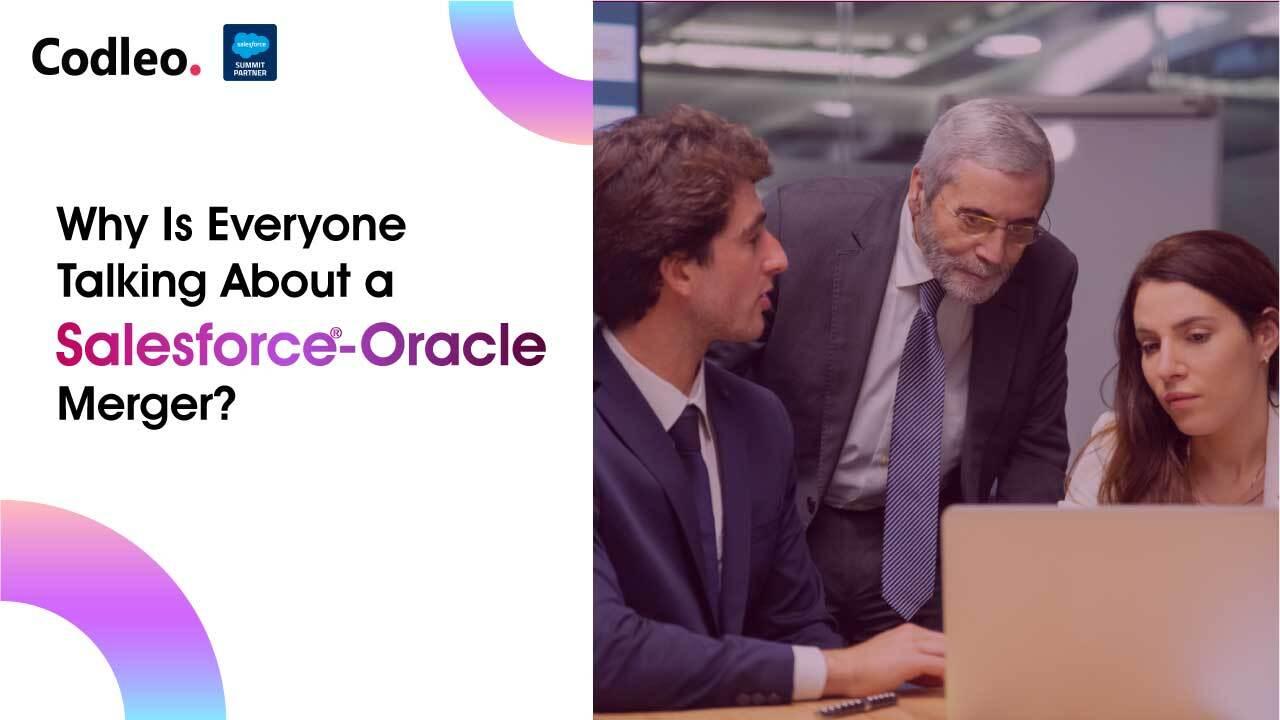


As 2025 begins, the pace of innovation in AI and enterprise technology is showing no signs of slowing down. Just in the past few weeks, we’ve seen headlines ranging from the massive $500 billion Stargate announcement to Nvidia’s historic one-day stock plunge triggered by Deepseek—followed by a partial rebound fueled by speculation and industry chatter. And now, the spotlight shifts once again, with discussions around a potential merger between two of the biggest names in enterprise software: Salesforce and Oracle.
To clear the air right away, no official statements or credible reports are confirming a merger between Salesforce and Oracle. The speculation largely stems from an opinion piece published by The Information last week, titled “Why Oracle and Salesforce Should Merge.”
In that article, analyst Anita Ramaswamy connected Oracle’s role in the $500 billion Stargate initiative to a possible strategic fit with Salesforce. Her reasoning pointed to Oracle’s relatively smaller scale and tighter financial position compared to tech giants like Microsoft and Google.
Oracle’s recent push into AI hardware—particularly chips and servers—has strained its balance sheet. According to The Information, the company holds only $10.9 billion in cash against $90 billion in liabilities. In contrast, a merger with Salesforce, expected to generate around $10 billion in cash this year alone, could help strengthen Oracle’s liquidity while it doubles down on AI investments.
Adding fuel to the chatter, TechGig published an article titled “How an Oracle-Salesforce Deal Could Redefine Tech Leadership,” which has already attracted nearly 20,000 views across social platforms. Notably, the piece relies entirely on The Information as its source, suggesting that much of the current buzz is more speculation than fact.
The idea of Oracle acquiring or merging with Salesforce is not new. Back in 2015, Bloomberg reported that Salesforce was receiving takeover interest, and Oracle’s name surfaced at a time when it was aggressively pursuing cloud leadership.
Fast forward to 2021, SaaStr founder Jason Lemkin argued in a Q&A that such a deal would already be too late, noting Salesforce’s market cap at $123 billion and Oracle’s at $189 billion. Today, those numbers have grown significantly—Salesforce is valued at around $328 billion, while Oracle sits at approximately $476 billion.
If such a deal were to happen now, it would be historic. The transaction would surpass Vodafone’s $183 billion merger with Mannesmann in 1999—an amount that equates to nearly $335 billion when adjusted for inflation.
Adding intrigue to the speculation is the personal history between the two companies’ leaders. Marc Benioff, now Salesforce’s CEO, was once Oracle’s youngest vice president and considered Larry Ellison a mentor. Ellison even became an early investor when Benioff launched Salesforce’s groundbreaking cloud CRM in 1999. But over time, that mentor-protégé relationship gave way to one of tech’s fiercest rivalries, as Salesforce disrupted the industry and quickly outpaced traditional software vendors.
While the idea of Salesforce and Oracle merging is exciting, making it happen would be difficult. Both companies would face several challenges:
A deal of this scale would attract global regulators. Authorities in the U.S., EU, and Asia would closely examine whether such a merger could create a monopoly in the enterprise software and cloud markets. Past mega-deals in tech have shown that antitrust approvals are lengthy and complicated.
Salesforce is known for its fast-moving, innovative, and customer-first culture. Oracle is known for its traditional and aggressive business style. Because of this, combining these very different company cultures would be a major challenge.
Salesforce’s platform is built around cloud-native CRM, while Oracle has deep roots in databases, ERP, and infrastructure. Merging these massive systems would be costly, complex, and could take years to integrate fully.
Salesforce and Oracle both have millions of customers worldwide. If there is uncertainty about their product plans or service reliability, businesses may hesitate to stay with them. This could drive them to competitors like Microsoft or Google.
In short, while the financial and strategic arguments may look compelling, the practical barriers to such a merger remain incredibly high.
While a merger between Salesforce and Oracle may seem unlikely at this stage, the idea itself is fascinating. With AI advancements driving efficiency and the potential cost savings such a partnership could unlock, the financial upside would be significant.
Despite being fierce rivals, the two companies operate in different strengths. Oracle dominates in areas like data centers and ERP solutions, while Salesforce has built one of the most powerful brands in cloud CRM—an asset Oracle could benefit from if such a deal ever became reality.
At Codleo Consulting, we know that whether or not this merger ever happens, what truly matters is how businesses like yours use Salesforce today. As a certified Salesforce partner, we help organizations integrate systems, streamline workflows, and maximize the value of their CRM investments. Our team of expert Salesforce consultants is ready to guide you with strategic advice and hands-on support.
👉 Ready to take your Salesforce journey to the next level? Contact Codleo today, and let’s build the future of your business together.
Publish date: 12th February, 2025